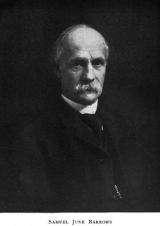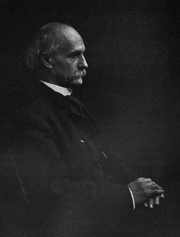
Samuel J. Barrows
Encyclopedia
Samuel June Barrows was a U.S. Representative
from Massachusetts
.
He was born in New York City. After his father died at a young age, he was relied upon to support his family by working for a printing press. Due to illness, he was rejected by the United States Navy
and didn't serve in the American Civil War
. He worked as secretary to William H. Seward
, and was married to Isabel Barrows
, who filled in for him as a stenographer in 1868 while he was ill, becoming the first woman employed by the State Department. He graduated from the Harvard Divinity School
in the fall of 1871. While at Harvard, he was the Boston correspondent of the New York Tribune
.
He went with the Yellowstone Expedition of 1873, under the command of General Stanley, and with the Black Hills Expedition in 1874, commanded by General Custer
. In 1873 he took part in the Battle of the Tongue River
.
He was pastor of the first parish, Dorchester (Boston), Massachusetts, from 1876-1881, when he resigned to become editor of the Christian Register
, with Isabel as the associate editor, positions they held for 16 years. During his time at the Christian Register, Barrows was a ceaseless advocate for women's suffrage, temperance, and Native American education.
He was the American representative to the International Prison Congress of 1895, 1900, and 1905, at which he was elected to serve as president of the 1910 congress.
 Barrows was elected as a Republican
Barrows was elected as a Republican
to the Fifty-fifth
Congress (March 4, 1897-March 3, 1899). During his term in Congress, he promoted legislation that would remove Native Americans from reservations, believing that cultural assimilation would lead to equality. Also a pacifist, Barrows bitterly opposed the Spanish-American War
. He was an unsuccessful candidate for reelection in 1898 to the Fifty-sixth
Congress. After which he was Secretary of the New York Prison Association from 1899 to 1909.
He died on April 21, 1909, of pneumonia
in New York City’s Presbyterian Hospital. His remains were cremated and the ashes placed in a private burying ground near Georgeville, Quebec, Canada.
United States House of Representatives
The United States House of Representatives is one of the two Houses of the United States Congress, the bicameral legislature which also includes the Senate.The composition and powers of the House are established in Article One of the Constitution...
from Massachusetts
Massachusetts
The Commonwealth of Massachusetts is a state in the New England region of the northeastern United States of America. It is bordered by Rhode Island and Connecticut to the south, New York to the west, and Vermont and New Hampshire to the north; at its east lies the Atlantic Ocean. As of the 2010...
.
He was born in New York City. After his father died at a young age, he was relied upon to support his family by working for a printing press. Due to illness, he was rejected by the United States Navy
United States Navy
The United States Navy is the naval warfare service branch of the United States Armed Forces and one of the seven uniformed services of the United States. The U.S. Navy is the largest in the world; its battle fleet tonnage is greater than that of the next 13 largest navies combined. The U.S...
and didn't serve in the American Civil War
American Civil War
The American Civil War was a civil war fought in the United States of America. In response to the election of Abraham Lincoln as President of the United States, 11 southern slave states declared their secession from the United States and formed the Confederate States of America ; the other 25...
. He worked as secretary to William H. Seward
William H. Seward
William Henry Seward, Sr. was the 12th Governor of New York, United States Senator and the United States Secretary of State under Abraham Lincoln and Andrew Johnson...
, and was married to Isabel Barrows
Isabel Barrows
Isabel Chapin Barrows was the first woman employed by the United States State Department. She worked as a stenographer for William H. Seward in 1868 while her husband, Samuel June Barrows, was ill. She later became the first woman to work for Congress as a stenographer...
, who filled in for him as a stenographer in 1868 while he was ill, becoming the first woman employed by the State Department. He graduated from the Harvard Divinity School
Harvard University
Harvard University is a private Ivy League university located in Cambridge, Massachusetts, United States, established in 1636 by the Massachusetts legislature. Harvard is the oldest institution of higher learning in the United States and the first corporation chartered in the country...
in the fall of 1871. While at Harvard, he was the Boston correspondent of the New York Tribune
New York Tribune
The New York Tribune was an American newspaper, first established by Horace Greeley in 1841, which was long considered one of the leading newspapers in the United States...
.
He went with the Yellowstone Expedition of 1873, under the command of General Stanley, and with the Black Hills Expedition in 1874, commanded by General Custer
George Armstrong Custer
George Armstrong Custer was a United States Army officer and cavalry commander in the American Civil War and the Indian Wars. Raised in Michigan and Ohio, Custer was admitted to West Point in 1858, where he graduated last in his class...
. In 1873 he took part in the Battle of the Tongue River
Battle of the Tongue River
The Battle of the Tongue River, sometimes referred to as the Connor Battle, was the major engagement of the Powder River Expedition of 1865, directed against the Southern Cheyenne, Arapaho and Lakota Sioux. It destroyed for a time the Arapaho capability to raid the Bozeman Trail and overland mail...
.
He was pastor of the first parish, Dorchester (Boston), Massachusetts, from 1876-1881, when he resigned to become editor of the Christian Register
Christian Register
The Christian Register was the leading American Unitarian weekly, published by the American Unitarian Association, Boston, until 1957 when "becoming less and less focused on Christianity" the title was changed to The Unitarian Register...
, with Isabel as the associate editor, positions they held for 16 years. During his time at the Christian Register, Barrows was a ceaseless advocate for women's suffrage, temperance, and Native American education.
He was the American representative to the International Prison Congress of 1895, 1900, and 1905, at which he was elected to serve as president of the 1910 congress.

Republican Party (United States)
The Republican Party is one of the two major contemporary political parties in the United States, along with the Democratic Party. Founded by anti-slavery expansion activists in 1854, it is often called the GOP . The party's platform generally reflects American conservatism in the U.S...
to the Fifty-fifth
55th United States Congress
-House of Representatives:* Republican: 206 * Democratic: 124* Populist: 22* Silver Republican: 3* Silver: 1* Independent Republican: 1TOTAL members: 357-Leadership:-Senate:* President: Garret Hobart * President pro tempore: William P...
Congress (March 4, 1897-March 3, 1899). During his term in Congress, he promoted legislation that would remove Native Americans from reservations, believing that cultural assimilation would lead to equality. Also a pacifist, Barrows bitterly opposed the Spanish-American War
Spanish-American War
The Spanish–American War was a conflict in 1898 between Spain and the United States, effectively the result of American intervention in the ongoing Cuban War of Independence...
. He was an unsuccessful candidate for reelection in 1898 to the Fifty-sixth
56th United States Congress
-House of Representatives:- Leadership :- Senate :* President: Garret Hobart , until November 21, 1899 , vacant thereafter.* President pro tempore: William P. Frye * Democratic Caucus Chairman: James K. Jones...
Congress. After which he was Secretary of the New York Prison Association from 1899 to 1909.
He died on April 21, 1909, of pneumonia
Pneumonia
Pneumonia is an inflammatory condition of the lung—especially affecting the microscopic air sacs —associated with fever, chest symptoms, and a lack of air space on a chest X-ray. Pneumonia is typically caused by an infection but there are a number of other causes...
in New York City’s Presbyterian Hospital. His remains were cremated and the ashes placed in a private burying ground near Georgeville, Quebec, Canada.
External links
- Samuel J. Barrows at Find-A-Grave

